|
|
|
Sort Order |
|
|
|
Items / Page
|
|
|
|
|
|
|
| Srl | Item |
| 1 |
ID:
165798


|
|
|
|
|
| Summary/Abstract |
On April 30, 1928, a court in the town of Bursa, Republic of Turkey, found three American mission-school teachers guilty of proselytizing in contravention of Turkish law.1 Edith Sanderson, Lucille Day, and Jeannie Jillson received a light punishment, a small fine, and a three-day imprisonment, which they were allowed to serve by being confined to school grounds. Yet the leniency of the judgment belied the magnitude of the case during a tectonic shift in local politics that reverberated across the Atlantic.
|
|
|
|
|
|
|
|
|
|
|
|
|
|
|
|
| 2 |
ID:
168664


|
|
|
|
|
| Summary/Abstract |
Energy storage technologies are receiving increasing attention in the UK and around the world as a means of increasing penetration of inflexible low-carbon electricity generation and optimising investment in energy infrastructure required to meet international decarbonisation goals. Research into the social acceptability of energy infrastructure has compellingly illustrated the importance of societal perceptions in the successful deployment of new infrastructure. However to date, no study has empirically examined public perceptions across the broad range of storage technologies available. We address this gap by presenting qualitative findings from four deliberative workshops held with members of the British public. We show that citizens underestimate the challenge of growing volumes of inflexible low-carbon electricity generation, and respond to storage technologies through reference to commonly perceived risks and benefits. When participants discussed how storage might be funded and managed, additional evaluative criteria emerged centred around equity, vulnerability, independence and convenience. Our findings suggest that perceptions of storage technologies tend to be ambivalent, and that acceptance is likely to be contingent on whether storage technologies can be designed, regulated and governed in ways which reduce technical concerns over safety, environmental impacts and reliability, while meeting societal desires for equity and the protection of vulnerable groups.
|
|
|
|
|
|
|
|
|
|
|
|
|
|
|
|
| 3 |
ID:
168665
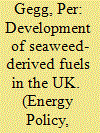

|
|
|
|
|
| Summary/Abstract |
Macroalgae (seaweed)-derived fuels are gaining increasing attention due to the high rate of seaweed growth, its lack of lignocellulose (which makes for energy-efficient processing), its lack of need for land or freshwater, and its potential suitability for commercial applications in the UK. However, while technological issues are progressively being solved, wider issues of stakeholder and public perception have largely been ignored, potentially hindering the development of this technology. This research fills this gap by conducting 19 interviews with stakeholders and 7 focus groups with members of the public to gain a deeper and broader understanding of perceptions of macroalgae-derived fuels. The results highlight the technological promise and confidence in the potential of macroalgae-derived fuels. However, they also emphasise conflicts and uncertainties among stakeholders (e.g. competition with other high-value products derived from macroalgae) and the general public (e.g. conflict with marine users). This paper provides insight into potential social resistance and key issues in the macroalgae-to-fuels supply chain. This information will enable two-way communication between everyone involved and increase the likelihood of successfully developing this supply chain. Key policy issues are discussed to facilitate this communication and encourage investment in the process.
|
|
|
|
|
|
|
|
|
|
|
|
|
|
|
|
| 4 |
ID:
113459
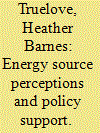

|
|
|
|
|
| Publication |
2012.
|
| Summary/Abstract |
This paper represents the most in-depth effort conducted to date to assess affective, emotional and cognitive perceptions of coal, natural gas, nuclear, and wind energy and the relationship between these perceptions and support for the energy sources. U.S. residents, recruited from a consumer panel, completed surveys assessing image associations, emotional reactions, and cognitive beliefs about energy sources and support for increased reliance on energy sources and local siting of energy facilities. The content of images produced by participants when evaluating energy sources revealed several interesting findings. Additionally, analysis of the image evaluations, emotions, and beliefs about each energy source showed that coal and nuclear energy were viewed most negatively, with natural gas in the middle, and wind viewed most positively. Importantly, these affective, emotional, and cognitive perceptions explained significant amounts of variance in support for each of the energy sources. Implications for future researchers and policy makers are discussed.
|
|
|
|
|
|
|
|
|
|
|
|
|
|
|
|
| 5 |
ID:
128419


|
|
|
|
|
| Publication |
2014.
|
| Summary/Abstract |
To date, academic research relating to Marine Renewable Energy (MRE) has largely focused on resource assessment, technical viability and environmental impact. Experiences from onshore renewable energy tell us that social acceptability is equally critical to project success. However, the specific nature of the marine environment, patterns of resource distribution and governance means experiences from onshore may not be directly applicable to MRE and the marine environment. This paper sets out an agenda for social studies research linked to MRE, identifying key topics for future research: (i) economic impacts; (ii) wealth distribution and community benefits; (iii) communication and knowledge flow; (iv) consultation processes; (v) dealing with uncertainty; (vi) public attitudes; and (vii) planning processes. This agenda is based on the findings of the first workshop of ISSMER, an international research network of social scientists with interests in marine renewable energy. Importantly, this research agenda has been informed by the experiences of developers, regulators and community groups in Orkney. The Orkney archipelago, off the north coast of Scotland, is home to the most intense cluster of MRE research, development and deployment activity in the world today.
|
|
|
|
|
|
|
|
|
|
|
|
|
|
|
|
| 6 |
ID:
171505


|
|
|
|
|
| Summary/Abstract |
Effective deployment of Distributed Energy Storage (DES) will depend in part on public attitudes and acceptance at both community and household levels. Here, we present the results of an exploratory survey to understand prospective public acceptance of DES technologies at household and community level in the UK (N = 949). The research design draws on previous qualitative technology acceptance work that was undertaken to inform the survey. We show that while the level of awareness of DES among the UK public is still very low, initial evaluation of information on domestic and neighbourhood battery storage is positive and evokes positive feelings that are significant predictors of positive attitudes. Moreover, the UK public has strong expectations about the technology, its benefits and its management. In particular, the results point to a bounded and place-based role for altruism: that people are more likely to accept energy storage facilities in their neighbourhood if they are for the benefit of that same neighbourhood. The results help us to understand public expectations of the technologies and the institutions relevant to decentralised energy design and deployment by commercial and public sector actors, as well as having implications for policy design and communication strategies.
|
|
|
|
|
|
|
|
|
|
|
|
|
|
|
|
| 7 |
ID:
127917


|
|
|
|
|
| Publication |
2014.
|
| Summary/Abstract |
Along with climate change and affordability, concerns about energy security are key drivers behind proposals for major energy system change in the UK and numerous other countries. Unlike climate change we know very little about how the public thinks and feels about this aspect of sustainability and energy policy. Beyond engaging critically with conceptual and theoretical discussions, empirical data from two surveys (Cardiff postal survey, N=520; online UK survey, N=499) using a ten item energy security scale are presented and discussed. Here we show that aspects of energy security are certainly of concern to the UK public, with particularly high concern around dependence on fossil fuels/imports and relatively lower expressed concern for actual disruption of energy supply. However public concerns around energy security are only emerging, and likely to change depending on the context in which it is discussed (e.g. in comparison to climate change). In addition, findings from public interviews are used to further contextualise the survey findings, showing unfamiliarity among the UK public with regards to the term "energy security". We discuss implications, and further work that would be useful for understanding public perceptions in more dept
|
|
|
|
|
|
|
|
|
|
|
|
|
|
|
|
| 8 |
ID:
159837
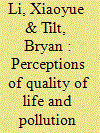

|
|
|
|
|
| Summary/Abstract |
After decades of rapid economic development, China is facing severe environmental problems. In particular, smog in urban areas has recently attracted a great deal of scientific and media attention both domestically and internationally. Our focus in this article is on public perceptions of smog in the northern city of Tangshan, which is routinely ranked as one of the urban areas with the worst air quality in the nation. In this article, we present the results of qualitative interviews and quantitative surveys with 341 urban residents. We examine how these residents perceive and weigh the importance of various aspects related to quality of life, including their experience with air pollution. Study participants considered environmental quality an issue of lower priority than many others; however, they surprisingly ranked it over economic concerns such as jobs and income. Their responses suggest that, for many urban residents, environmental problems like smog are fundamentally linked to basic quality of life concerns such as physical health and family well-being. We interpret our findings in the context of literature on the rise of China's middle class, the rise of environmental consciousness, and the role of gender in mediating perceptions of pollution and family health. We also consider the implications of these findings for the control and remediation of air pollution in China today.
|
|
|
|
|
|
|
|
|
|
|
|
|
|
|
|
| 9 |
ID:
180654
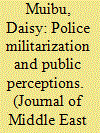

|
|
|
|
|
| Summary/Abstract |
How can one encourage greater public cooperation with police forces and improve their legitimacy during times of protracted conflict and fragile governance? Can police militarization play a role in improving public perceptions toward law enforcement in these contexts? The prevailing perception is that police militarization undermines public opinion toward the police. Yet, there has been little empirical evaluation of the impact that militarization has on public attitudes in conflict-affected regions. Relying on original survey data collected in the city of Kismaayo, Somalia, this study examines the impact that perceived police militarization has on public perceptions toward a newly introduced police force operating in a region with an active insurgent-terrorist threat. Results of regression analysis and qualitative field interviews suggest that militarization can actually improve residents’ willingness to cooperate with the police, as well as perceptions of police legitimacy. The perceived militarization of this nascent police force conveys a level of preparedness and professionalism to residents exposed to decades of conflict.
|
|
|
|
|
|
|
|
|
|
|
|
|
|
|
|
| 10 |
ID:
132626


|
|
|
|
|
| Publication |
2014.
|
| Summary/Abstract |
The present decade is considered to be vitally important both as regards addressing energy requirements and for environmental protection purposes. The decisions taken, both on an individual and a collective level, will have a decisive impact on the environment, and primarily on climate change, due to the increased energy demands and the need to reduce carbon use in energy generation.
The present study was designed and carried out while an extensive debate was ongoing in Greece regarding changes to the legislative framework that would specifically disallow new applications for the installation of photovoltaic systems; its aim is to depict the attitude of Greek citizens, through the completion of 1068 questionnaires. The research results show that over half the respondents are informed about the use of photovoltaic systems for electricity generation. Furthermore, almost half are willing to invest in such systems, either at home or on a plot of land. The factors contributing to the installation of photovoltaic systems are mainly "environmental", "financial" and "social". Finally, the citizens who are most willing to invest in residential photovoltaic systems are mainly university or technical school graduates; they would rather take such a decision after being motivated by institutional bodies and would do so for reasons of recognition.
|
|
|
|
|
|
|
|
|
|
|
|
|
|
|
|
| 11 |
ID:
105273
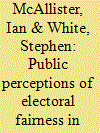

|
|
|
| 12 |
ID:
089982
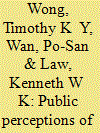

|
|
|
|
|
| Publication |
2009.
|
| Summary/Abstract |
This article examines the patterns and changes in public perceptions of domestic income inequality in Hong Kong in the past two decades and explains individual variations in these perceptions. It found that the perceived seriousness of income disparities had been persistently high, while the perceived unjustness of income disparities showed a fluctuating trend. Our findings lent partial support to the structural position thesis that the privileged groups are less likely than the underprivileged groups to consider existing income disparities to be serious and unjust. Nonetheless, the popular understanding of poverty is still biased towards 'individual' explanations, and this perhaps explains why the government is less willing to tackle the economic and political foundations of poverty in Hong Kong.
|
|
|
|
|
|
|
|
|
|
|
|
|
|
|
|
| 13 |
ID:
135043
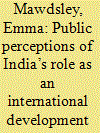

|
|
|
|
|
| Summary/Abstract |
The literature on South–South Development Cooperation (ssdc) has grown exponentially in the past few years. One focus of analysis has been how domestic institutions and agendas shape the approaches to development cooperation of different Southern partners. However, few analysts to date have commented on how the ‘ordinary’ general public of these countries might perceive or assess their country’s role in international development. Through a study based on interviews and media analysis, this paper attempts to tease out the slim evidence currently available on ‘public’ attitudes in India, concentrating, for reasons explained, exclusively on elites and ‘middle classes’. It argues that, while some domestic criticism will certainly accompany the growing visibility of Indian development cooperation, the attractive blend of discursive positioning and material benefits may provide the Indian government with broad support for its growing investment and profile in international development, or at least offset a degree of criticism. At present there appears to be little public discussion about whether and how India’s external role relates to domestic poverty, or the nature of growth and ‘development’ that India is helping to stimulate in partner countries. The paper also discusses ‘boundary making’ with China through the public construction of Indian development cooperation.
|
|
|
|
|
|
|
|
|
|
|
|
|
|
|
|
| 14 |
ID:
094766


|
|
|
|
|
| Publication |
2010.
|
| Summary/Abstract |
The American policy landscape during the George W. Bush administration was shaped by a series of traumatic events that confronted the nation and people of the United States. These included the terrorist attacks of 9/11 in 2001, the anthrax attacks in the fall of 2001, military actions in Afghanistan and Iraq, Hurricane Katrina in 2005, the threat of a flu pandemic in 2005 and 2006, the 2007 Intergovernmental Panel on Climate Change reports, and the financial collapse of 2008. The results of the 2008 presidential election appear to be a rejection of the Bush administration's major policy responses to these events, but the variation in type and level of public support among different groups suggests a much more varied and dynamic portrait of America in turbulent times. Using a multiyear panel survey, an interdisciplinary team of political scientists and psychologists analyzed the behavior and political responses to the events by the American public. The findings suggest that even seven years after the events of 11 September 2001, people with higher levels of post-traumatic stress symptomatology related to 9/11 have significantly different interpretations of the threat of terrorism and the appropriate policy responses to it than do others. Perceptions of threat, the political salience of terrorism and other traumatic events, the level of support for political leaders and assessments of the government's actions vary over time and across different groups within society based on the psychological, political and social, and personal characteristics of the respondent. These results help to open the black box of aggregate public opinion by providing a detailed portrait of how psychological, social, political, and personal factors affected perceptions and political behavior during the George W. Bush administration.
|
|
|
|
|
|
|
|
|
|
|
|
|
|
|
|
| 15 |
ID:
134219


|
|
|
|
|
| Publication |
2014.
|
| Summary/Abstract |
We compare public perceptions of biobanks in China and in Europe, reporting similarities and differences in how publics in Europe and China view key issues in the realm of biobank research. Despite many differences in perception, the similarity in the perception of biobanks in China and in Europe is striking. Our research finds that Chinese with lower education levels are less concerned about privacy, while those with higher education levels have preferences in privacy protection that are similar to those in Europe. Transnational research is perceived positively in both regions, but specific historical experiences shape how people approach these issues. While Chinese publics focus on certain effects of international research on the Chinese state, Europeans are mainly concerned about data security and impacts on research. The study is based on 66 focus groups conducted in China (6) and Europe (60), with approximately 700 participants.
|
|
|
|
|
|
|
|
|
|
|
|
|
|
|
|
| 16 |
ID:
098617
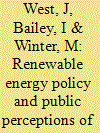

|
|
|
|
|
| Publication |
2010.
|
| Summary/Abstract |
Public opposition to the siting of renewable energy (RE) facilities and public reluctance to invest in RE remain key obstacles to the expansion of the renewables sector in the UK and a number of other European countries. Although there is a growing body of qualitative research on factors that inform public attitudes towards RE, the majority of studies have tended to be quantitative and to view 'the public' and 'public opinion' as homogeneous wholes. This study uses a cultural theory framework and focus groups conducted in the South West UK to develop deeper understandings of how individuals' worldviews can inform opinions and behaviour in relation to RE. These findings are used to explore ways in which government policies on RE might be tailored to engender greater public support and participation. Issues discussed include the provision of economic incentives, information on climate change and RE, linking renewables to overall energy behaviour, and landscape aesthetics.
|
|
|
|
|
|
|
|
|
|
|
|
|
|
|
|
| 17 |
ID:
126513


|
|
|
|
|
| Publication |
2013.
|
| Summary/Abstract |
The aim of this paper is to explore social barriers to the adoption of smart homes through the analysis of expert views and public attitudes. Smart home services aim to improve the comfort, convenience and safety of householders, as well as allowing them to use energy more efficiently and cope with increasing costs. Despite the existence of smart homes and smart home technologies for some time, their prevalence is not widespread, and thus their potential largely untapped. Using a combination of in-depth deliberative public workshops, expert interviews and a review of the existing literature, this paper explores social barriers to smart home diffusion, including how these vary by expertise, life-stage and location. The research highlights the importance of barriers such as control, security, and cost, providing insights for policymakers as well as smart-home designers and developers as to how these might be addressed.
|
|
|
|
|
|
|
|
|
|
|
|
|
|
|
|
|
|
|
|
|